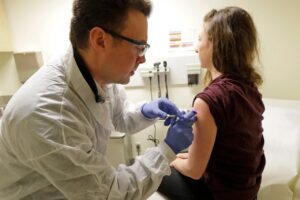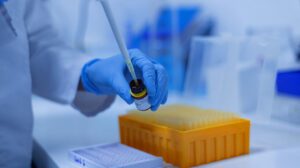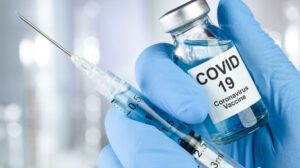
Over the past day, June 29, some 81,637 people were vaccinated against the coronavirus (COVID-19) disease in Ukraine, while 21,475 Ukrainians received the first dose of the vaccine, and 60,162 received the second, the press service of the Ministry of Health reports. “Some 81,637 people were vaccinated against COVID-19 per day on June 29, 2021. Some 21,475 people received the first dose, and 60,162 people were fully immunized. Some 518 mobile teams, 1,336 vaccination points, and two vaccination centers worked during the day,” the ministry said on Telegram.
It is noted that as of June 29, 2021, some 756,424 people were on the waiting list for vaccination against COVID-19.
“Since the beginning of the vaccination campaign, 1.934 million people have been vaccinated, of which 1.933.944 received the first dose, and 649,524 people were fully immunized and received two doses [two of them received the first dose abroad]. A total of 2.583 million vaccinations were carried out,” the Ministry of Health said.

Germany allows entry into the country from June 25 for persons fully vaccinated against coronavirus (COVID-19) with vaccines approved by the European Medicines Agency.
“Starting from June 25, 2021, entry from Ukraine to Germany for people fully vaccinated against SARS-CoV-2 with vaccines approved by the European Medicines Agency (EMA) will be possible again. Fully vaccinated persons will be able to re-enter Germany for the purpose of visiting friends, acquaintances and relatives, as well as for tourism purposes. Visa-free travel for Ukrainian citizens with biometric passports will be possible again,” the German Embassy in Ukraine said in a statement. It is noted that those persons who have received vaccinations with one of the vaccines indicated on the Paul-Ehrlich-Institute website will have the right to enter Germany, if at least 14 days have passed since the day of inoculation with the last required dose or vaccine that requires one dose.
“Currently, this only applies to vaccines recognized by the European Medicines Agency. The list of vaccines is also planned to be expanded and supplemented with other vaccines with similar protective standards as soon as the necessary tests are completed,” the embassy said.
It is noted that it is necessary to provide a European digital COVID certificate or an analogue of vaccination confirmation in digital or paper form, issued in German, English, French, Italian or Spanish.
“For people who have recovered from the disease, the vaccine can consist of only one dose of the vaccine. In order to confirm the full vaccination, people who have recovered must also be proved that they were sick with the SARS-CoV-2 coronavirus before vaccination. Confirmation of the fact of the disease must be a positive result of PCR test,” the embassy said.
In addition, persons under the age of 12 and who have not yet received COVID-19 vaccine may, if they have documented proof of the test (PCR or antigen test), enter Germany accompanied by one or both fully vaccinated parents. Persons who have not yet turned six years old do not need confirmation of testing.

The Ministry of Foreign Affairs of Ukraine and the Ministry of Health of Ukraine have been instructed to prepare proposals on the advisability of installing additional controls and restrictions on migration between Ukraine and countries where the Delta coronavirus (COVID-19) strain is rapidly spreading.
According to the presidential press service, during a conference call at the President’s Office, its participants heard information from the National Academy of Sciences of Ukraine on the spread of COVID-19 Delta strain.
According to the National Academy of Sciences, “this strain of coronavirus is 1.6 times more infectious than the Alpha strain, some 2.26 times more likely to lead to hospitalization, and the risk of resuscitation in case of infection increases 1.45 times.”

In January-May this year, Ukraine International Airlines (UIA) processed 68,000 requests for refunds to passengers of flights canceled due to the coronavirus (COVID-19) pandemic, having made refunds totaling about $20 million.
According to the UIA press service on Thursday, in March-May the airline reviewed and processed 39,000 requests, providing refunds in the amount of more than $9 million.
According to the company, from April 2020 to June 2021, UIA paid back more than $41 million to passengers.
“The airline once again emphasizes its readiness for a dialogue and sincerely hopes for the understanding of the situation on the part of passengers. UIA’s communication departments are doing everything possible to process every request as soon as possible,” the report said.

Ukraine has registered 1,188 new cases of coronavirus (COVID-19), as well as 4,682 recoveries and 55 deaths in the past 24 hours, the Ukrainian Health Ministry press service said in a statement on Thursday.
“Ukraine registered 1,188 new cases of COVID-19 on June 17, 2021. In particular, 62 children and six medical workers contracted the virus. Over the past day, 601 persons were hospitalized, 55 died, and 4,682 recovered,” the ministry said on Telegram.
Ukraine reported 1,045 contagions the day before.
As of this date, Ukraine has recorded 2.227 million cases of COVID-19, including 2.146 million recoveries and 51,902 deaths.

Almost every second Ukrainian plans to be vaccinated against coronavirus, while 19% of citizens intend to do this in the near future, the same number plan to be vaccinated later, another 10% will be vaccinated only when they have to do it for formal reasons, according to the results of the survey entitled “Attitude of Ukrainian citizens to vaccination against COVID-19,” held by the Razumkov Center from May 21 to May 26.
It is reported that compared to March 2021, the proportion of respondents who answered that they do not intend to get vaccinated against coronavirus decreased from 51.5% to 43%.
At the same time, the share of those who intend to get it in the near future (or have already received such a vaccination) increased from 12% to 19%, from 16% to 19% – the share of those who intend to be vaccinated, but later, 10% (the same as in March) intend to do this only when it is necessary for formal requirements (for example, for a trip abroad).
The older the respondents, the more often they express their lack of desire to get vaccinated (their share increases from 38% among those aged 18 to 29, to 51% among those aged 60 and over).
Among those who do not give up their intention to get vaccinated against COVID-19, 59% are ready to do it only if it is free (this is more than in March, by 7%), 23% of them are ready to pay for the vaccine, and another 6% are willing to pay to get vaccinated out of turn. The older the respondents, the more often they answer that they are ready to be vaccinated only free of charge (the proportion of such increases from 49% among those who are between 18 and 29 years old, to 77% among those who are 60 and over).
Those respondents who do not intend to be vaccinated are more often motivated by the fact that, in their opinion, the vaccines used in Ukraine are not sufficiently effective and safe, but they are ready to be vaccinated with “some other” vaccine (this answer is given by 31% of those who do not intend to get vaccinated).
Although, compared to March, the proportion of those who do not trust the vaccine has decreased (then it was 45% of those who refused to be vaccinated). Some 30% of them motivate their refusal by the fact that, in their opinion, the risks of vaccination exceed the risks of the disease itself, 15% – by the fact that they have already had coronavirus, 12% have medical contraindications, and 7.5% believe that the likelihood that they will get COVID-19 is very low.
The survey was conducted by the sociological service of the Razumkov Center from May 21 to May 26, 2021 using the method of face-to-face interviews at the place of residence of the respondents.
A total of 2,017 respondents aged 18 and over were interviewed in all regions of Ukraine, with the exception of Crimea and the occupied territories of Donetsk and Luhansk regions, based on a sample representing the adult population in terms of basic socio-demographic indicators. The theoretical sampling error (excluding the design effect) does not exceed 2.3% with a probability of 0.95. The research was carried out with the financial support of the representative office of the Friedrich Naumann Foundation for Freedom in Ukraine.